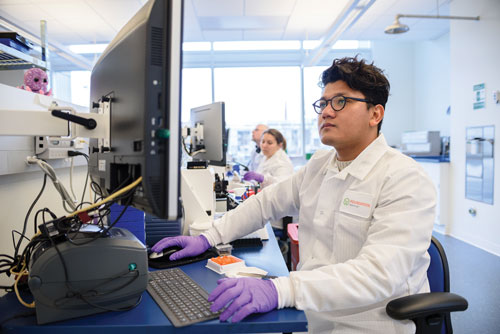July 1, 2015 (Vol. 35, No. 13)
Foundation Medicine Strengthens Informatics Support System for Precision Therapies
Foundation Medicine plans to fundamentally change the way cancer is diagnosed and treated by providing the molecular information physicians need to match therapies to conditions.
“Cancer is a genomic disease,” Steve Kafka, Ph.D., COO, points out, but until recently its primary descriptor has been its location in the body. That has spawned research focused on prostate cancer, breast cancer, colon cancer, etc. that didn’t look at the genomic causes of the disease. Zeroing in on cancer genomics is a paradigm shift.
“The important thing is to understand the molecular drivers of cancer. Therefore, our tests are comprehensive across the genome,” Dr. Kafka says. “Our approach is information-based. We want to understand each patient’s cancer at a deep molecular level, drawing on scientific and medical literature and targeted drug therapies to help researchers and physicians make the best patient-selection and treatment decisions.”
Although Foundation Medicine is only five years old, it has already introduced two innovative, market-leading tests, notes Dr. Kafka, who adds that the company has a strong pipeline of new products.
One of those pipeline products tests for circulating tumor DNA. This liquid biopsy-based DNA diagnostic test “is a whole new approach for physicians,” he insists, “so we must educate the market about the use of genomic profiling in decision-making.” This as-yet-unnamed test is suited for situations in which obtaining a tissue specimen is difficult, such as those with lung cancer or very advanced disease.
“Expect broader applications for this test as more drugs become available,” Dr. Kafka says.
In addition, Foundation Medicine is developing the Interactive Cancer Explorer® (ICE), a portal to help physicians assess patient reports. ICE2™ incorporates a new patient-matching feature so a physician may match a current patient to one with a similar genomic profile and tissue type in the anonymized 35,000-patient Foundation Medicine database. As a result, physicians may connect with peers around the world, sharing genomic information, treatment plans, and outcomes to improve patient care.

Foundation Medicine’s molecular information platform aims to improve day-to-day care for patients by serving the needs of clinicians, academic researchers, and drug developers to help advance the science of molecular medicine in cancer. [Jon Chomitz for Foundation Medicine]
Identifying Biomarkers
Working with Roche, Foundation Medicine is in the early stages of advancing tests to identify biomarkers to predict response to immunotherapy. “This is an exciting new area where therapies are being developed that tap into the body’s immune response,” Dr. Kafka remarks. But, he emphasizes, “It’s still in the research phase.”
Foundation Medicine is participating in the Exceptional Responders Initiative with the National Cancer Institute. “We’re one of several organizations participating,” Dr. Kafka says. This project assesses tumor samples from 300 patients who respond exceptionally well to therapies, achieving either a complete or durable partial response.
The goal is to gain a better understanding of the biologic and molecular underpinnings of cancer and the reasons for these exceptional responses. That understanding may help researchers identifying novel therapeutic vulnerabilities and improve medical outcomes for more patients.
Foundation Medicine’s research complements its initial products, FoundationOne® for solid tumors and FoundationOne® Heme for blood. Since their respective launches in 2012 and 2013, more than 35,000 patients have used these tests, enabling the company to amass a database from “real-world, community settings,” Dr. Kafka asserts. Those two products earned the company a place on MIT Technology Review’s list of disruptive companies in 2013.
With insights gained from those two tests, the company, Dr. Kafka argues, now has the ability to understand certain segments of cancer—including those that may be specific to age: “For example, at ASCO 2014, we presented research showing genomic alterations that may be specific to certain adolescent and young adult cancers, helping to guide better treatment decisions by the physicians.”
Fast Company
Since Dr. Kafka joined Foundation Medicine about two and a half years ago, the company has transitioned from private to public. Roche acquired a majority stake in the company this spring. In 2014, more than 24,000 clinical tests were performed, up 167% from the previous year. Revenues for 2014 reached more than $61 million, for a 111% annual growth rate.
“It’s a fast-moving place,” Dr. Kafka declares. “Our recent strategic collaboration agreement with Roche will only accelerate our core business strategy.”
As part of the transaction, Roche infused $250 million into the company. The funds will accelerate product development and support the mission of making comprehensive genomic tests for cancer routine for oncologists. The deal allows Foundation Medicine to continue to operate independently.
Foundation Medicine is working with 24 partners, up from 15 only two years ago. The work includes profiling patients for clinical trials as well as using Foundation Medicine’s continually growing database to help direct companies’ clinical development strategies.
“We enable a virtuous cycle, in which each genomic profile we report makes us a bit smarter, thus informing the next iteration of trials,” Dr. Kafka says. “Fundamentally, we want to be a decision-support partner for each patient’s journey through cancer. Our mission is to bring the most powerful information possible to affect outcomes. We do that by introducing new products, new technologies, and new ways to integrate information more fully into physicians’ workflows.”
Foundation Medicine
Location: 150 Second Street, Cambridge, MA 02141
Phone: (617) 418-2200
Website: www.foundationmedicine.com
Principals: Michael Pellini, M.D., CEO and Steve Kafka, Ph.D., COO
Number of Employees: 300+
Focus: Foundation Medicine is a molecular informatics firm helping researchers and physicians access the latest data regarding cancer to guide patient selection and therapeutic decisions.



